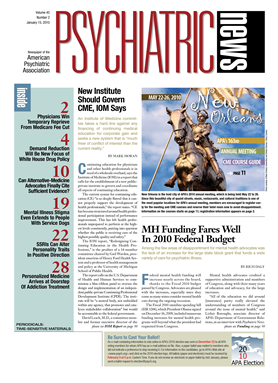Federal mental health funding will increase nearly across the board, thanks to the Fiscal 2010 budget passed by Congress. Advocates are pleased with the increases, especially since they come as many states consider mental health cuts during the ongoing recession.
The Fiscal 2010 omnibus spending bill (HR 3288), which President Obama signed on December 16, 2009, included numerous funding increases for mental health programs well beyond what the president had requested from Congress.
Mental health advocates credited a supportive administration and members of Congress, along with their many years of education and advocacy, for the large increases.
“All of the education we did around [insurance] parity really elevated the understanding of members of Congress around the issue of mental health,” said Lizbet Boroughs, associate director of APA's Department of Government Relations, in an interview with Psychiatric News.
Among the budgetary high points was the decision to more than double the administration's requested funding increase for mental health programs at the Substance Abuse and Mental Health Services Administration (SAMHSA) from $17 million to $36 million. The increase pushed the funding for SAMHSA programs administered by the Center for Mental Health Services (CMHS) to $1 billion for the first time.
Among the largest CMHS increases was a $13 million increase for Children's Mental Health programs to provide children who have mental, emotional, or behavioral disorders with community-based care and supports; a $20 million increase for the Substance Abuse Block Grant program; and a $40.3 million increase for substance abuse treatment, mainly for drug courts.
“We are very encouraged to see an increased investment in children's mental health services,” said Allison Wishon Siegwarth, a policy associate at the Bazelon Center for Mental Health Law. “That is absolutely essential.”
Advocates also celebrated a $5 million increase for state grants to relieve homelessness among people with mental illness. The increase will provide support to an estimated 11,000 additional people who are homeless and seriously mentally ill.
“People with mental illness are over-represented in the homeless population,” said Julio Abreu, senior director of government affairs for the advocacy group Mental Health America, in an interview with Psychiatric News. “This $5 million will go a long way.”
Congress also exceeded the administration's request for a 2 percent increase in the budget of the National Institutes of Health (NIH) and instead increased it to $31 billion, or 2.3 percent more than the previous fiscal year. Increases for NIH included a $39 million increase for the National Institute of Mental Health to a total of $1.49 billion; a $27 million increase for the National Institute on Drug Abuse to $1.06 billion; and a $12 million increase for the National Institute on Alcohol Abuse and Alcoholism to $462 million.
Level Funding Brushed Aside
In several areas Congress ignored the administration's request for level funding, such as the Section 811 Supportive Housing program, which was increased from $250 million to $300 million.
Similarly, a request for static funding for juvenile-justice programs was replaced with a $45 million increase to more than $345 million. Another request for level funding for the Mentally Ill Offender Treatment and Crime Reduction grant program was replaced with a $2 million increase to $12 million.
Among the few disappointments in the federal budget cited by mental health care advocates was the lack of an increase in the $421 million budget for the Community Mental Health Services block grant program. The block grants, which fund a wide range of state mental health programs, have been stagnant for several years.
“That is such an important program for the states so that they can have flexible funding to provide the services that are unique to each state,” said Wishon Siegwarth. “We were hoping for a bit more money there but we understand that in this economic environment it is difficult.”
Abreu noted that demand for the services offered through these state grants has increased in recent years. In addition, the lack of an increase effectively acts as a cut, due to inflation.
Recession-Battling Help Offered
The timing of the increases in federal mental health funding was hailed by advocates because they come as many states are either considering or have undertaken deep cuts to various mental health programs. For instance, Ohio has eliminated virtually all state funding for mental health treatment for individuals who are not eligible for the state's Medicaid program, according to the Center on Budget and Policy Priorities.
“All of these [federal] programs are important, particularly in light of states facing dramatic shortfalls,” Abreu said, about the recently enacted budget.
Despite the sizable increases, the final federal mental health funding generally remained well below recommended funding levels urged by the Mental Health Liaison Group, a coalition of advocacy groups that includes APA. That shortfall was not surprising, Boroughs said, because the coalition's request is usually seen as very optimistic.

